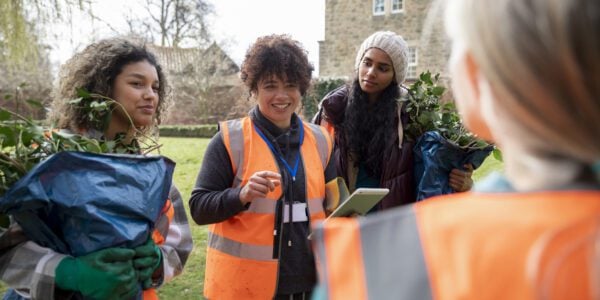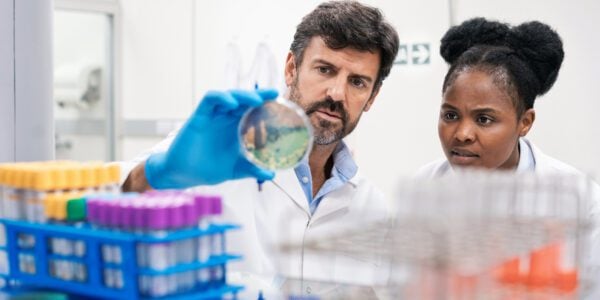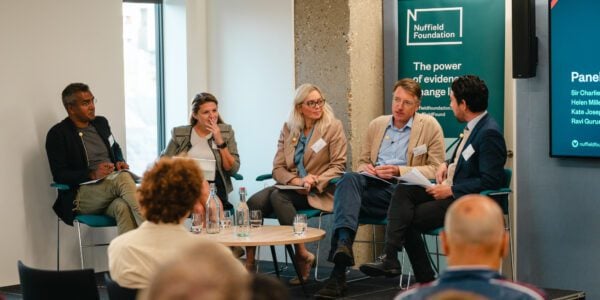The Nuffield Foundation’s Strategic Fund has been one of the cornerstones of our 2017-2022 strategy. In 2018, we scaled up our grants funding to encourage individual projects with a level of ambition to reflect the scope and urgency of our agenda.
We set a challenge to applicants: to propose research that addressed the pressure points and trends changing and shaping our digitally driven society. These projects would be multidisciplinary in their approach and engage with those working beyond the research world in policy and practice. We estimated that these grants would each be in the range of £1-3 million.
We have so far funded five large-scale strategic projects totalling £11.6 million. These were assessed and funded on a separate timetable and process to our usual research grants, for the most part in their own gathered fields.
We now intend to embed this approach as an integral aspect of our grant-making. We will continue to fund projects of a similar scale and character but do so as part of our standard application process.
Our strategic projects
| IFS Deaton Review of Inequalities | Led by Professor Sir Angus Deaton and Professor Sir Richard Blundell from the Institute for Fiscal Studies | £2.6 million | Examining how different kinds of inequality are related, which matter most, what is driving them, and the right mix of polices to tackle them. |
|---|---|---|---|
| Economy 2030 Inquiry | Led by Torsten Bell, Chief Executive of the Resolution Foundation and Professor Stephen Machin from the London School of Economics | £1.8 million | Exploring three major challenges facing the UK economy – Brexit, COVID-19 and the transition to a zero-carbon future. |
| The Skills Imperative 2035 | Led by Jude Hillary at the National Foundation for Educational Research | £2.5 million | Identifying the essential employment skills people will need for work by 2035. |
| The Future of Work and Well-being | Led by Professor Sir Christopher Pissarides at the Institute for the Future of Work | £1.8 million | Researching the implications of automation technologies and examining how they are transforming work, society and the economy in the UK. |
| Data and voice to improve children’s lives | Led by Professor Leon Feinstein at the Rees Centre, University of Oxford | £2.8 million | Research to improve the lives of children and families by better understanding their needs and experiences. |
The median cost of our grants is currently about £200,000, though grants range in value from around £15,000 to over £500,000. From 2022, we will continue to fund larger, strategic projects of over £750,000 in value, embedding them into our core grant-making. We will consider these strategic projects in one round of applications each year, which will enable us to assess in a single gathered field similarly-sized applications on a range of different subjects. We envisage funding one or two such projects each year, with outline applications submitted in March and those invited to full application stage to be considered by Trustees in November. The next deadline for outline applications is 14 March 2022.
In order to make the process as straightforward as possible for applicants, we will merge our Strategic Fund process with our standard research grant applications so that all applications run on the same assessment timetable.
- We will continue to have two deadlines each year for outline applications for projects up to £750,000 (in March and September)
- We will have one deadline each year for outline applications for projects over £750,000 (in March).
The criteria for these larger, strategic projects will remain the same. We do not see these as being simply larger versions of our standard grants. At a time of increasing social and economic turbulence and cultural uncertainty, we are looking for original and challenging ideas and uses of data that cross disciplines and explore the critical intersections between the Foundation’s three research domains of Education, Justice and Welfare, areas which we have identified as underpinning a well-functioning society.
These strategic grants should have the ambition to anticipate and address the complex and significant themes that will shape the UK public policy agenda over the next decade and beyond. Some themes were characterised in our strategy: the impact of digital technologies and the fourth industrial revolution; the future of education in a digitally-driven and diverse society; the relationship of social geography, gender and ethnicity to social well-being and disadvantage; and interventions that might promote opportunity and reduce adversity and vulnerability at different life stages and between generations. However, these themes are not intended to be exhaustive, and we welcome applications on others that align with our mission to advance social well-being in a just and inclusive society.
As with all Nuffield Foundations grants, successful applications will demonstrate a rigorous methodological approach while at the same time allowing researchers to articulate original questions, reframe public policy arguments and take account of and engage with the experience and perspectives of the communities who are the focus of that research. We want to give opportunities to a new generation of the best research talent, to encourage innovative methods and involvement with people from outside academic research in policy, frontline service delivery, and the voluntary sector.
It is a central principle of Nuffield Foundation research that it should have the capacity to make a demonstrable difference to people’s lives. We expect applicants to be clear who are the audiences for their research and how they will reach them. Applicants should also demonstrate how they envisage their work influencing future policy and practice, and the steps they will take to make that happen.
As an independent Foundation, we believe we have a critical role in encouraging the independence and originality of the work of those we fund. We look forward to working closely with all those engaging with us to explore and shape your ideas.
Full information on our criteria and process are available in our Guide for applicants.
About the author
Prior to joining the Nuffield Foundation in September 2016, Tim was Principal of St Anne’s College at the University of Oxford, a post he held for 12 years. He is a former Chair of the Which? Council.
Tim worked for 25 years in senior broadcasting roles, starting at the BBC where he was editor of Panorama and Newsnight, and later becoming Head of Current Affairs and Weekly News. He was Director of Television and Director of Programmes at Channel 4 from 1998 to 2003. From 2008 to 2015 Tim was a member of the Ofcom Board and was Chair of the Ofcom Content Board.
Tim was also the author of the Department for Culture Media and Sport Review of BBC Digital Radio Services in 2004, a member of Lord Burns’ Advisory Panel on the BBC Charter Review and a Director of SMG plc from 2005-7.































